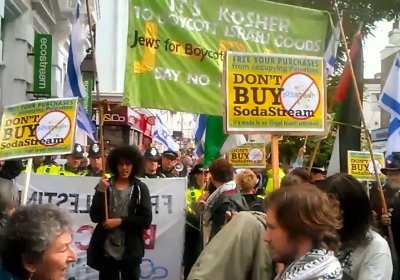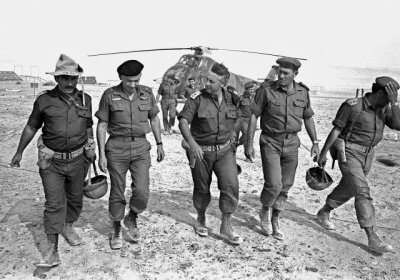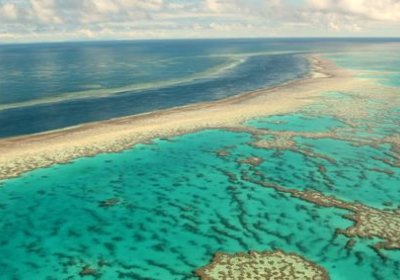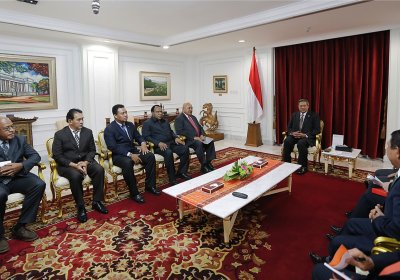"One year after Hugo Chavez's death: Eyewitness reports from Venezuela," was the title of a public forum organised by the Australia-Venezuela Solidarity Network (AVSN) at the Resistance Centre on February 4.
More than 40 people attended the forum, which heard a panel of speakers discuss issues facing the Bolivarian revolution today.
996
The movement for boycott, divestment and sanctions (BDS) against Israel has captured headlines around the world after actress Scarlett Johansson signed a promotion deal with Israeli company SodaStream.
Johansson signed the deal to become SodaStream's first “global brand ambassador” on January 1. A Super Bowl halftime commercial starring the actress airing on February 2.
However, the deal resulted in an instant furore due to the company's use of an Israeli occupied industrial settlement zone in Palestinian West Bank to make their home soda machines.
Beloved Land: Stories, Struggles & Secrets From Timor-Leste
Gordon Peake
Scribe, 2013
250 pages, $29.95 (pb)
East Timor is a tale of two statistics, says Gordon Peake in Beloved Land, his engaging blend of history, memoir and travelogue about the former Portuguese and Indonesian colony.
One of the world's poorest nations, East Timor ranks a lowly 120th of 169 countries on the United Nations Human Development Index, but scores high on corruption at 15th on the World Bank’s business transparency report.
War criminal and former Israeli prime minister Ariel Sharon, who died on January 11, led an infamous Israeli army terror group in the 1950s. Called Unit 101 and nicknamed the “avengers”, it operated without uniforms.
The unit countered Palestinian resistance with terror attacks. It carried out many outrages inside Israel and across its borders.
In August 1953, Unit 101 attacked the refugee camp of El-Bureig in Gaza. About 50 refugees were massacred. In October 1953, Sharon’s unit attacked the Jordanian village of Qibya.
In the third attack on the ABC by a government minister in the last month, Defence Minister David Johnston said on February 7 that reports that asylum seekers had their hands burned by navy personnel warrants an investigation into the national broadcaster.
"If ever there was an event that justified a detailed inquiry, some reform, an investigation of the ABC, this event is it," he said.
This follows comments by Prime Minister Tony Abbott on January 29 when he said the ABC “appears to take everyone’s side but Australia’s and I think it is a problem”.
The Great Barrier Reef Marine Park Authority (GBRMPA) has approved plans to dump 3 million cubic metres of sand and mud in the Great Barrier Reef Marine Park.
This waste will come from dredging the sea floor during construction of the Abbot Point coal terminal near Bowen and will be dumped about 25 kilometres away within the boundaries of the marine park.
Federal Environment Minister Greg Hunt initially approved the proposal, before passing it on to the GBRMPA to make the final decision.
Venezuelan President Nicolas Maduro said he would take “the most radical measures to protect our people's economy” as a deadline for businesses to adhere to new price controls approaches.
“We will expropriate whatever needs to be expropriated,” Maduro said during a February 4 speech in Caracas amid commemorations of the 22nd anniversary of a 1992 failed military rebellion.
The coup was led by Maduro's predecessor, Hugo Chavez. Although he was jailed for the insurrection, Chavez became a popular figure with the poor majority. He won the 1998 presidential elections by a landslide.
Tens of thousands of people marched to Spain's parliament in Madrid on February 1 to protest against a proposed new law that would severely curb access to abortion.
Changes to the law would permit abortions to be carried out only in cases of rape or serious risk to health.
The rally was organised by dozens of women's groups fighting for reproductive rights. Participants travelled from across the Spanish state to take part, with trains full of protesters arriving in Madrid throughout the day.
The decision of the National Union of Metalworkers of South Africa (NUMSA) to cut ties with the ruling African National Congress (ANC) has been badly analysed.
Comment has tended to focus on the possibility of a new political party in 2019, or whether suspended general secretary of the Congress of South African Trade Unions (COSATU) Zwelinzima Vavi will get his job back.
But the greater significance of the biggest trade union in the country throwing in its lot with a growing movement in opposition to the neoliberal order, and thus to the left of the ANC, is being missed.
It's celebrity time again. The Golden Globes have been, and the Oscars are coming. This is a “vintage year” say Hollywood's hagiographers on cue. It isn't.
Most movies are made to a formula for the highest return, money-fuelled by marketing and something called celebrity. This is different from fame, which can come with talent. True celebrities are spared that burden.
The irony of fracking is that it destroys the natural resource it needs most.
The tragedy for those living near fracking operations is that natural resource is the fresh ― and increasingly scarce ― water supply on which they, too, depend.
Fracking ― or hydraulic fracturing ― is the fracturing or rock by pressurised liquid. It is used to access several natural resources, such as shale gas and coal seam gas, in otherwise out-of-reach places.
The West Papuan independence movement's hopes of of gaining a foothold in the international community were set back when foreign minsters visiting West Papua pledged non-interference with Indonesia.
Last June, the Melanesian Spearhead Group (MSG) Leaders Summit met in Noumea, New Caledonia, and discussed a membership application from the West Papua National Council for Liberation (WPNCL). The summit postponed the decision until a ministerial delegation visited West Papua to determine the legitimacy of the group and to assess the situation in the occupied country.
- Previous page
- Page 3
- Next page








